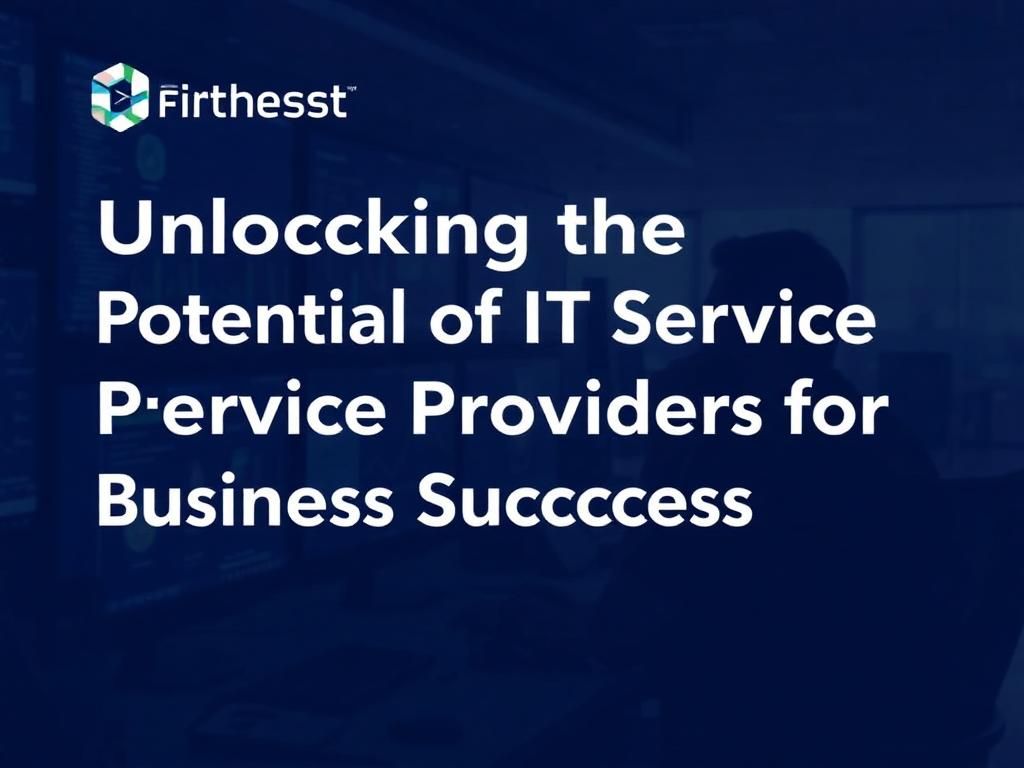Understanding IT service providers is essential in today’s technology-driven landscape. These organizations play a pivotal role in helping businesses operate efficiently and stay competitive. With the rapid digitization of various sectors, the demand for IT service providers continues to surge. In this article, we will explore the different facets of the IT service provider industry, including their roles, types, benefits, challenges, and future trends. This comprehensive overview aims to equip you with the knowledge to make informed decisions when choosing an IT service provider for your business.
Introduction to IT Service Providers
Definition of IT Service Provider
An IT service provider refers to any organization that offers information technology services to clients. These services can range from managed IT services, cloud solutions, cybersecurity, consulting, and much more. As businesses increasingly rely on technology to function, partnering with an IT service provider becomes crucial to ensuring seamless operations.
Overview of the IT Service Industry
The IT service industry encompasses a wide array of services and has grown significantly over the last decade. According to market reports, the industry is poised to reach over $1 trillion in global spending by 2025. With advancements in technology and the increasing necessity for digital transformation, the need for professional IT services is more pronounced. IT service providers are pivotal in facilitating this journey for numerous organizations worldwide.
Types of IT Service Providers
Managed Service Providers (MSPs)
Managed Service Providers (MSPs) are a type of IT service provider that take on the responsibility for managing IT services on behalf of their clients. Key characteristics of MSPs include:
- Proactive Management: They monitor systems proactively to prevent issues before they arise.
- Monthly Fees: Clients typically pay a flat monthly fee, allowing for predictable budgeting.
Services offered by MSPs often include:
- Network monitoring
- Data backup and recovery
- Cybersecurity measures
Cloud Service Providers (CSPs)
Cloud Service Providers (CSPs) deliver computing services over the internet, offering scalable resources to businesses. There are three main types of cloud services:
- Infrastructure as a Service (IaaS): Provides virtualized computing resources over the internet.
- Platform as a Service (PaaS): Offers hardware and software tools over the internet, primarily for application development.
- Software as a Service (SaaS): Delivers software applications over the internet on a subscription basis.
Prominent players in this market include AWS, Microsoft Azure, and Google Cloud, all of which lead the charge in innovation and service offerings.
Consulting Firms
Consulting firms specialize in strategizing IT implementations and optimizing a business’s technology environment. They help businesses formulate their IT strategy through:
- Assessment of current technology use
- Implementation of IT projects
Examples of renowned IT consulting firms include Accenture and Deloitte, known for their vast expertise and resources in the field.
Value-Added Resellers (VARs)
Value-Added Resellers (VARs) are companies that enhance the value of third-party products by adding features or services. They play a crucial role in the ecosystem by:
- Providing Customer Support: Offering guidance on product usage and functionality.
- Offering Installation and Training: Ensuring that customers can maximize their investment in technology.
Services Offered by IT Service Providers
Infrastructure Management
In today’s business landscape, infrastructure management is essential. IT service providers manage and maintain hardware and networks, which includes:
- Regular hardware maintenance
- Network setup and optimization to ensure optimal performance
Software Development and Support
Software development encompasses creating customized solutions tailored to specific business needs. This can include:
- Creating bespoke software solutions that streamline business processes
- Providing ongoing application management and support to ensure software longevity
Cybersecurity Services
With the rising number of cyber threats, the importance of cybersecurity services cannot be overstated. Providers focus on:
- Conducting threat assessments to identify vulnerabilities
- Implementing incident response plans to manage and mitigate attacks
Data Management and Analytics
Data has become a valuable asset for businesses, and effective data management is crucial. IT service providers assist with:
- Providing data storage solutions to ensure information is secure and accessible
- Offering business intelligence and analytics services to derive actionable insights
Benefits of Partnering with an IT Service Provider
Cost Efficiency
Engaging an IT service provider can lead to significant cost savings. Key benefits include:
- Reduction in operational costs: Fewer staffing needs and lower overhead costs.
- Predictable pricing structures: Monthly fees allow for better budget management.
Access to Expertise
Businesses benefit greatly from the specialized skills of IT service providers. This includes:
- Availability of specialized knowledge: Enables organizations to leverage the latest technologies.
- Keeping up with industry trends: Providers stay updated on best practices and emerging technologies.
Focus on Core Business Functions
Outsourcing to an IT service provider allows companies to:
- Concentrate on their primary business objectives without being bogged down by IT concerns.
- Improve overall productivity by freeing up internal resources.
Scalability and Flexibility
One of the key advantages of partnering with IT service providers is the ability to:
- Easily adjust resources based on changing business needs.
- Adapt quickly to market changes, thus enhancing agility.
Choosing the Right IT Service Provider
Identifying Business Needs
Understanding your business’s IT needs is critical when selecting an IT service provider. Key steps include:
- Assessing current IT infrastructure and identifying gaps.
- Defining clear objectives for what services are needed.
Evaluating Service Providers
When considering potential providers, it’s important to evaluate based on:
- Experience in relevant industries and technical expertise.
- Client reviews and testimonials to gauge satisfaction.
Understanding Pricing Models
Different IT service providers offer various pricing structures, such as:
- Hourly rates for consultative services.
- Project-based pricing for specific deliverables.
- Subscription fees for ongoing services and support.
Comparing costs across multiple providers will allow for a better-informed decision.
Assessing Customer Support
Effective customer support is crucial for any partnership. Ensure to:
- Review the responsiveness and knowledge of support teams.
- Understand the terms of the Service Level Agreement (SLA) to ensure expectations are aligned.
Challenges Faced by IT Service Providers
Keeping Up with Rapid Technological Changes
IT service providers must navigate the complexities of rapidly evolving technology. Challenges include:
- Regularly updating skills and knowledge through continuous training.
- Integrating new technologies into existing frameworks.
Competition in the Market
The IT service market is intensely competitive. Providers must differentiate themselves by:
- Innovating their service offerings.
- Building a solid reputation through exceptional service delivery.
Managing Client Expectations
Successful management of client expectations is vital for IT service provider success. Important strategies include:
- Clear communication regarding project timelines and deliverables.
- Handling project delays with transparency and professionalism.
The Future of IT Service Providers
Trends Shaping the Industry
The IT service industry is witnessing several transformative trends, including:
- AI and machine learning: Increasingly utilized for improving efficiency and decision-making.
- Cybersecurity and data privacy: Heightened importance as companies face growing threats.
The Role of Automation
Automation is revolutionizing how services are delivered. Potential benefits include:
- Enhanced efficiency and accuracy in service operations.
- Reduction of human error in repetitive tasks.
Shifts in Client Needs
The rise of remote work and digital transformation has shifted client expectations, leading to:
- Increased demand for more customized and flexible solutions.
- A necessity for services that support remote teams and secure access to data.
Conclusion
Recap of Key Points
This exploration of IT service providers has revealed their critical role in modern business, offering various benefits and services that enhance operational efficiency. From understanding different types to recognizing how to select the right provider, the knowledge gained here can be pivotal in navigating today’s digital landscape.
Call to Action
Evaluate your organization’s IT needs and consider strategically selecting an IT service provider that aligns with your business objectives. Doing so is essential for navigating future industry challenges and driving success.
Additional Resources
Recommended Reading and Tools
For those keen on diving deeper, consider exploring the following:
- Essential IT Service Management – A must-read for anyone interested in IT governance and services.
- CIO.com – A valuable resource for IT leaders exploring trends and best practices.
Industry Associations and Communities
Participating in associations can facilitate networking and ongoing professional development:
- CompTIA – A leading voice for the IT industry.
- IT Service Management Forum (itSMF) – A global organization dedicated to IT service management.
| Type | Definition | Main Services | Examples |
|---|---|---|---|
| MSPs | Manage IT services for clients | Cybersecurity, data backup | Datto, ConnectWise |
| CSPs | Offer computing services via the cloud | IaaS, SaaS, PaaS | AWS, Microsoft Azure |
| Consulting Firms | Strategize and optimize IT implementation | IT assessment, strategy development | Deloitte, Accenture |
| VARs | Enhance third-party products with services | Installation, support, training | CDW, SHI |
FAQ
What is an IT service provider?
An IT service provider offers a variety of technology services to businesses, ranging from managed services to cloud solutions.
How do I choose the right IT service provider?
Evaluate your business needs, assess potential providers based on their experience, and review client testimonials.
What services do IT service providers typically offer?
They commonly provide managed services, cloud solutions, consulting, cybersecurity, and data management services.
What are the benefits of working with an IT service provider?
Description includes cost efficiency, access to expertise, focus on core functions, and enhanced scalability.
How does automation impact IT service delivery?
Automation streamlines operations, reduces errors, and improves efficiency in service provision.
What challenges do IT service providers face?
The main challenges include keeping up with technology, competition, and managing client expectations.
Where can I find IT service providers?
You can find IT service providers through industry directories, recommendations, or searching online.
Is cybersecurity included in IT service offerings?
Yes, many IT service providers offer comprehensive cybersecurity services to protect businesses from digital threats.
What role do consulting firms play in IT services?
Consulting firms help businesses develop their IT strategy, assess current technology usage, and implement IT projects effectively.
Do IT service providers support remote work?
Yes, many providers offer services tailored to support remote teams and secure access to necessary data.


